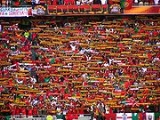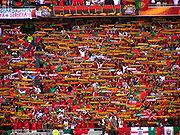
Football in Portugal
Encyclopedia
History
Football started to gain popularity in PortugalPortugal
Portugal , officially the Portuguese Republic is a country situated in southwestern Europe on the Iberian Peninsula. Portugal is the westernmost country of Europe, and is bordered by the Atlantic Ocean to the West and South and by Spain to the North and East. The Atlantic archipelagos of the...
in the late 19th century, brought by Portuguese students who returned from England
England
England is a country that is part of the United Kingdom. It shares land borders with Scotland to the north and Wales to the west; the Irish Sea is to the north west, the Celtic Sea to the south west, with the North Sea to the east and the English Channel to the south separating it from continental...
.
The first organised game of football took place in 1875 in Camacha
Camacha
Camacha is a parish in the district of Santa Cruz in the Madeira Islands. It is about 6.5 km northeast of Funchal, 12 km south of Porto da Cruz and 7.5 km southwest of Santo António da Serra...
, Madeira
Madeira
Madeira is a Portuguese archipelago that lies between and , just under 400 km north of Tenerife, Canary Islands, in the north Atlantic Ocean and an outermost region of the European Union...
. Organised by the Madeira born Harry Hinton. This being the first organised game of football anywhere in Portugal
The first person responsible for its implementation in mainland Portugal would have been Guilherme Pinto Basto (according to some people, his brothers Eduardo and Frederico would have brought the ball from England). It was he who had the initiative to organise an exhibition of the new game, which took place in October 1888, and it was also him who organized the first football match on mainland Portugal in January of the following year. The match, played where today the Campo Pequeno bullring is located, involved opposing teams from Portugal and England. The Portuguese won the game 2-1. Consequently, football started attracting the attention of the high society, being distinguished by the Luso-British rivalry.
Later, the game spread, being practised in colleges and leading to the foundation of clubs all over the country. Until the end of the century, associations such as Clube Lisbonense, Carcavelos Sport Club, Braço de Prata, Real Ginásio Clube Português, Estrela Futebol Clube, Futebol Académico, Campo de Ourique, Oporto Cricket, and Sport Clube Vianense were founded to practise this sport or created sections for competing.
The first match, between Lisbon
Lisbon
Lisbon is the capital city and largest city of Portugal with a population of 545,245 within its administrative limits on a land area of . The urban area of Lisbon extends beyond the administrative city limits with a population of 3 million on an area of , making it the 9th most populous urban...
and Porto
Porto
Porto , also known as Oporto in English, is the second largest city in Portugal and one of the major urban areas in the Iberian Peninsula. Its administrative limits include a population of 237,559 inhabitants distributed within 15 civil parishes...
, took place in 1894, attended by King Carlos
Carlos I of Portugal
-Assassination:On 1 February 1908 the royal family returned from the palace of Vila Viçosa to Lisbon. They travelled by train to Barreiro and, from there, they took a steamer to cross the Tagus River and disembarked at Cais do Sodré in central Lisbon. On their way to the royal palace, the open...
.
Clube Internacional de Futebol (founded in 1902) was the first Portuguese team to play abroad, defeating Madrid Fútbol Clube
Real Madrid C.F.
Real Madrid Club de Fútbol , commonly known as Real Madrid, is a professional football club based in Madrid, Spain. The club have won a record 31 La Liga titles, the Primera División of the Liga de Fútbol Profesional , 18 Copas del Rey, 8 Spanish Super Cups, 1 Copa Eva Duarte and 1 Copa de la...
in 1907; the game took place in Madrid
Madrid
Madrid is the capital and largest city of Spain. The population of the city is roughly 3.3 million and the entire population of the Madrid metropolitan area is calculated to be 6.271 million. It is the third largest city in the European Union, after London and Berlin, and its metropolitan...
, Spain
Spain
Spain , officially the Kingdom of Spain languages]] under the European Charter for Regional or Minority Languages. In each of these, Spain's official name is as follows:;;;;;;), is a country and member state of the European Union located in southwestern Europe on the Iberian Peninsula...
.
On the 31st of March 1914, the 3 regional associations that existed in Portugal
Portugal
Portugal , officially the Portuguese Republic is a country situated in southwestern Europe on the Iberian Peninsula. Portugal is the westernmost country of Europe, and is bordered by the Atlantic Ocean to the West and South and by Spain to the North and East. The Atlantic archipelagos of the...
(Lisbon, Portalegre and Porto), merged to create a national association called "a União Portuguesa de Futebol" which is the ancestor of the current national association "Federação Portuguesa de Futebol" which was formed on the 28th of May 1926.
Club football
The main domestic football competition is the Primeira Liga, where the dominating teams are Futebol Clube do Porto, Sporting Clube de Portugal, and Sport Lisboa e Benfica.Currently, the oldest team is Académica, which was founded in 1876. Futebol Clube do Porto, after an unsuccessful attempt in 1893, appeared in 1906, stimulated by José Monteiro da Costa, among others. Sporting Clube de Portugal was founded in 1906 by the Viscount of Alvalade and his grandson José de Alvalade. Sport Lisboa e Benfica was born in 1904 (the club maintained the foundation date of Sport Lisboa, founded in 1904, when in 1908, the two assimilated into the Grupo Sport Benfica, founded in 1906). They are all clubs that traditionally have several sports activities but they give great distinction to football, making use of teams of professional players, which frequently participate in European competitions.
National team

Portugal national football team
The Portugal national football team represents Portugal in association football and is controlled by the Portuguese Football Federation, the governing body for football in Portugal. Portugal's home ground is Estádio Nacional in Oeiras, and their head coach is Paulo Bento...
is currently ranked third in FIFA world ranking, which is their highest ever. Their lowest rank was 43rd overall in 1998.
Portugal hosted UEFA Euro 2004, but were defeated in a huge upset to champions Greece
Greece national football team
The Greece national football team represents Greece in association football and is controlled by the Hellenic Football Federation, the governing body for football in Greece. Greece's home ground is Karaiskakis Stadium in Piraeus and their head coach is Fernando Santos...
in the final. The Portuguese national team also reached the semi-finals of the FIFA World Cup twice; in 1966
1966 FIFA World Cup
The 1966 FIFA World Cup, the eighth staging of the World Cup, was held in England from 11 July to 30 July. England beat West Germany 4–2 in the final, winning the World Cup for the first time, so becoming the first host to win the tournament since Italy in 1934.-Host selection:England was chosen as...
, when Eusébio
Eusébio
Eusébio da Silva Ferreira, GCIH, GCM , commonly known simply as Eusébio, is a retired Mozambican-born Portuguese football forward. He is considered one of the best footballers of all-time by the IFFHS, experts and fans...
was the top scorer, with nine goals, and also in 2006
2006 FIFA World Cup
The 2006 FIFA World Cup was the 18th FIFA World Cup, the quadrennial international football world championship tournament. It was held from 9 June to 9 July 2006 in Germany, which won the right to host the event in July 2000. Teams representing 198 national football associations from all six...
, with Cristiano Ronaldo
Cristiano Ronaldo
Cristiano Ronaldo dos Santos Aveiro, OIH, , commonly known as Cristiano Ronaldo, is a Portuguese footballer who plays as a winger or striker for Spanish La Liga club Real Madrid and is the captain of the Portuguese national team...
and Luís Figo
Luís Figo
Luís Filipe Madeira Caeiro Figo, OIH, is a Portuguese former international footballer. He played as a midfielder for Sporting CP, FC Barcelona, Real Madrid, and Internazionale, during a career which spanned over a period of 20 years. He retired from football on 31 May 2009...
. This was the first time since 1966 that the Portuguese football team had advanced to a such a high qualifying round in a World Cup tournament.
See also
- Sport in PortugalSport in PortugalFootball is the most popular and practised sport in Portugal. Other than football, many other professional or semi-professional well organized sport competitions take place every season in Portugal, including basketball, swimming, athletics, tennis, gymnastics, futsal, rink hockey, team handball,...

